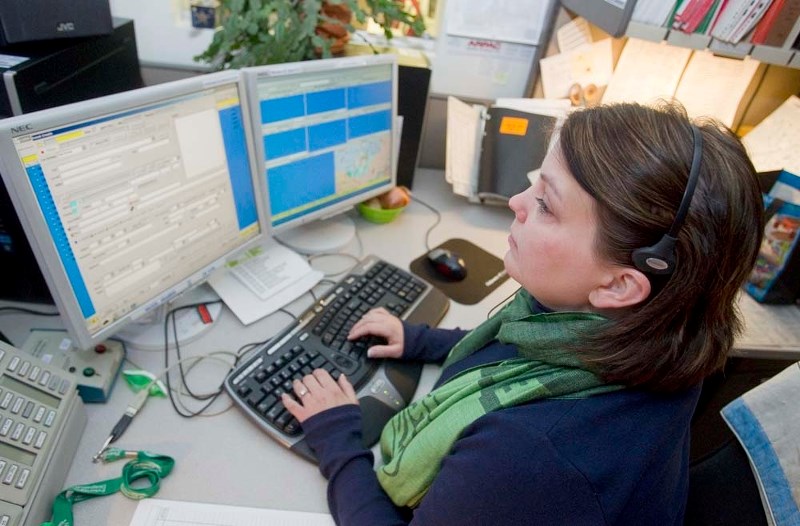You only hear them when you have no one else to call, when no one else can help you.
"911. Police, fire or ambulance?" says the distant voice on the other end of the telephone line.
Laura Fuoco is one of those voices. She works as a 911 dispatcher at the St. Albert RCMP detachment on Boudreau Road.
She's the one you call for help when you think someone has broken into your house, the person you tell when you see a car accident blocking traffic.
"We're the first contact people have with the RCMP," notes Fuoco.
When you call 911 and ask for police, you will talk to one of eight full-time RCMP dispatchers. If you need the fire department or an ambulance, you will be transferred to another dispatch centre.
Unlike any other municipality in the capital region, St. Albert has its own 911 dispatch centre where two people work the phone lines 24 hours a day, seven days a week.
Calls from all other communities in northern Alberta – including Morinville – go to the 911 dispatch centre at RCMP K Division in Edmonton.
Having dispatchers who live in St. Albert and are familiar with the area can be better than a GPS map, says Lorrie Benjamin, operational support supervisor at the St. Albert detachment.
If callers don't know the actual address of their location but can identify landmarks, dispatchers can track them down quicker than a cell tower pingback.
"When you work locally, you actually know where they're at even if they might not know. It's that local knowledge, you just can't beat it," Benjamin says.
In a busy month, dispatchers in St. Albert answer 1,100 police calls. They also answer municipal enforcement calls – dogs at large, parking and noise complaints, icy sidewalks, and weed control – which average about 200 per month.
The dispatch centre has two lines designated for 911 calls as well as two backup lines.
Fuoco explains it is rare that people calling 911 will have to hold for the next operator, a more common occurrence at larger dispatch centres.
"There's not a ton of overflow. If there was a major accident on the trail then 20 people usually call about the same thing."
When a fire ripped through a Heritage Lakes home in November, the centre received 49 calls for that incident alone, Fuoco recollects.
911 not 411
Benjamin stresses that 911 is only for emergencies like life and death situations.
"We still get people calling 911 for a barking dog complaint. This is 911 not 411," she says.
Benjamin broke down the total calls dispatch received for October, November and December of 2013 into top categories. Two percent of the calls were categorized as assaults, 1.25 per cent were break and enters (residential and business), one per cent domestic disputes and 20 per cent of the calls were about motor vehicle collisions.
"I think it's important for people to know that because we don't have a lot of assaults or domestics. I think St. Albert is a pretty darn safe place to live," she says.
Dispatchers say the most important information callers can provide them is location. Then the five Ws – who, what, when, where, why. They also need to know if weapons or alcohol are involved.
The more information they have, the better they can inform the RCMP officers going to the scene.
"The (RCMP) members know that we're getting as much and the best information we can so that we're not sending them into a potentially dangerous situation," says Fuoco.
Treena Pitruniak, a dispatcher of 22 years, says there is a reason they work closely with the officers.
"The statistics show that domestic violence is almost the highest dangerous situation that an officer can go into because even though they might not have a weapon, they could have (one) when you get there."
In those situations dispatchers keep the callers on the line for as long as possible, says Pitruniak, whether it is a case of physical assault or a child calls because Mom and Dad are fighting.
"We are their safety," she says.
"They hear your voice on the other end and they know someone's got their back," adds Fuoco. "They know what to expect from you and you know what to expect from them. It's like a family."
911 not nine to five
Dispatchers in St. Albert work 12-hour shifts – five days on, five days off.
With the nature of the calls they get – from car flips, to fires, to fatalities –it can be hard sometimes to leave work at work.
"There are days when I'm driving home and I think 'Wow, somebody died today'," Pitruniak says.
For Fuoco, a call she took 10 years ago as a dispatcher in B.C. about a missing elderly couple, still sticks with her. The couple was found, both alive and well, but every so often a call will trigger that memory.
Pitruniak says the job takes a special type of personality, one that is able to let things go.
"When you're at work, you're at work and you do your job. You also have to have a good sense of humour," she says.
"You never know what you're going to get when you pick up the phone."
What happens when you…
… pocket dial? "Sometimes you hear shuffling. Last week I heard a toilet in the background, which was not very pleasant," chuckles Pitruniak.
She says often the dispatcher can gauge if there is an emergency or not, but they will always call you back to double check. She reminds people to lock their cellphone screens.
… dial by accident?
"If someone misdials 911, the last thing we want them to do is hang up," says Benjamin, adding the caller needs to stay on the line long enough to talk to a dispatcher.
"We can never just let a 911 call go. It's not an option."
RCMP complaint/non-emergency line
St. Albert: 780-458-7700<br />Morinville: 780-939-4520




